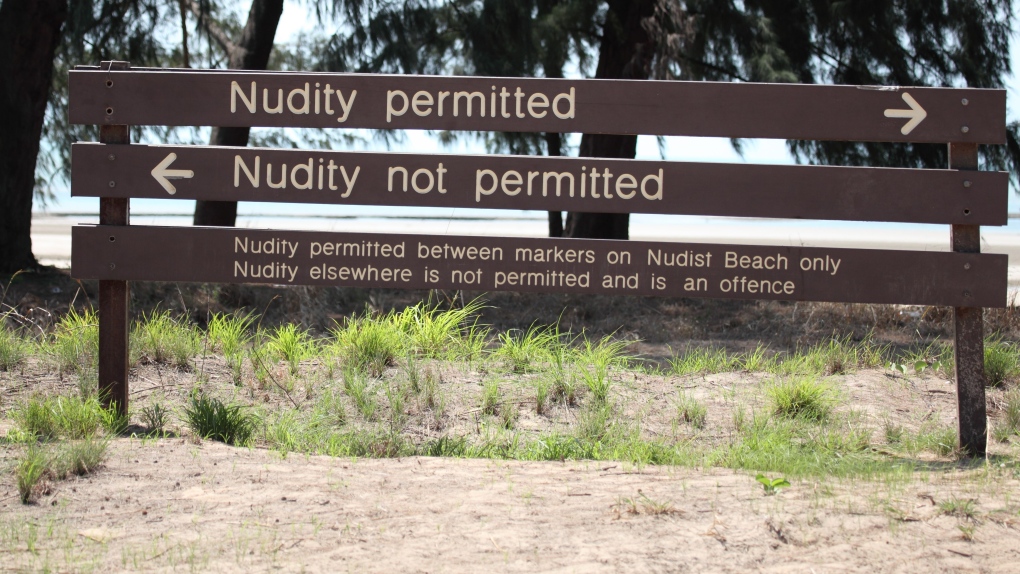Public nudity petition sponsored by former Green Party leader Elizabeth May
 (Shutterstock.com)
(Shutterstock.com)
Former Green Party leader Elizabeth May has sponsored a petition calling on the federal government to repeal the Criminal Code's prohibition of public nudity, but she says she has not signed it and doesn’t support it.
The petitioner is identified as James Andrew Porter who lives in May's Vancouver Island riding.
"Nudity is not intrinsically sexual, indecent or obscene," the petition says. "The existing prohibition on public nudity harms society by reinforcing the notion that the human body is inherently shameful."
Other reasons listed for scrapping the offence from the Code include the "significant benefits to physical and mental health" of nudism and the elimination of the pollution caused by laundering clothes.
Being nude "without lawful excuse" has been an offence both in public and on private property and within public view since 1954.
"For the purposes of this section, a person is nude who is so clad as to offend against public decency or order," the Code reads.
However, charging and prosecuting someone for the crime requires the "consent of the Attorney General."
As of Tuesday, the petition had gathered 405 signatures. Of those, 178 were from Ontario and 72 from British Columbia. In both of those provinces, it is already legal for women to be topless in public.
In a statement, May said her sponsorship should not be misconstrued as an endorsement.
"To be clear, I am not a supporter of the petitioners' goal. I am not a supporter of public nudity. I do support the rights of citizens in a democracy to get direct answers from their government. This is an avenue too few Canadians know is available to them," she writes.
Any member of the public can initiate a petition to the House of Commons in an effort to "draw attention to an issue of public interest or concern" that is under the jurisdiction of the federal government and to request action from elected officials, according to an overview on the federal government's website.
However, a member of Parliament is required to authorize its publication.
"MPs are expected to sponsor or present any petition approved by the Parliamentary officers as allowable. Presenting a petition does not mean the MP supports the petition," May explained.
If 500 electronic signatures are received, the petition is certified and presented to Parliament and the government has 45 days to table a response.
"Paper petitions have been presented to the House of Commons for more than 100 years. Roughly 1,500 paper petitions are presented every year," according to the federal government. "Electronic petitions were established in 2015. Roughly 200 e-petitions are open for signature every year and gather over 500,000 signatures."
CTVNews.ca Top Stories

Driver who entered Canada 'without stopping' at B.C. border crossing arrested: police
A man who illegally blew through the Canada-U.S. border crossing in Surrey, B.C., Sunday morning has been arrested, according to authorities.
Man responsible for New Year's truck attack previously visited New Orleans, Ontario, Egypt: FBI
The man responsible for the truck attack in New Orleans on New Year's Day that killed 14 people visited the city twice before and recorded video of the French Quarter with hands-free glasses, an FBI official said Sunday.
'Absolutely devastating': Southern Manitoba golf course clubhouse burns for second time in 4 years
A golf course clubhouse in Morden, Man. went up in flames Sunday for the second time in less than four years, and mere days after its reopening from the previous fire was celebrated.
Thousands are without power due to winter storm hitting Newfoundland and Labrador
Massive waves slammed Newfoundland and Labrador's coastline on Sunday, as a powerful winter storm left thousands without power.
Pamela Anderson, Ryan Reynolds among Canadians vying for Golden Globes tonight
Tonight’s Golden Globes will feature a strong Canadian presence, with British Columbia actors Pamela Anderson and Gabriel LaBelle among the first-time nominees.
The Vivienne, star of 'RuPaul's Drag Race UK', dies at 32
British reality show 'RuPaul's Drag Race UK' winner James Lee Williams, aged 32, popularly known as The Vivienne, has died.
Driving into Manhattan? That'll cost you, as new congestion toll starts Sunday
New York’s new toll for drivers entering the center of Manhattan debuted Sunday, meaning many people will pay US$9 to access its busiest part in peak hours.
WATCH Woman critically injured in explosive Ottawa crash caught on camera
Dashcam footage sent to CTV News shows a vehicle travelling at a high rate of speed in the wrong direction before striking and damaging a hydro pole.
Heaviest snowfall in a decade possible in some areas as winter storm threatens U.S.
A blast of snow, ice, wind and plunging temperatures stirred up dangerous travel conditions in parts of the central U.S. on Sunday, as a disruptive winter storm brought the possibility of the 'heaviest snowfall in a decade' to some areas.
































